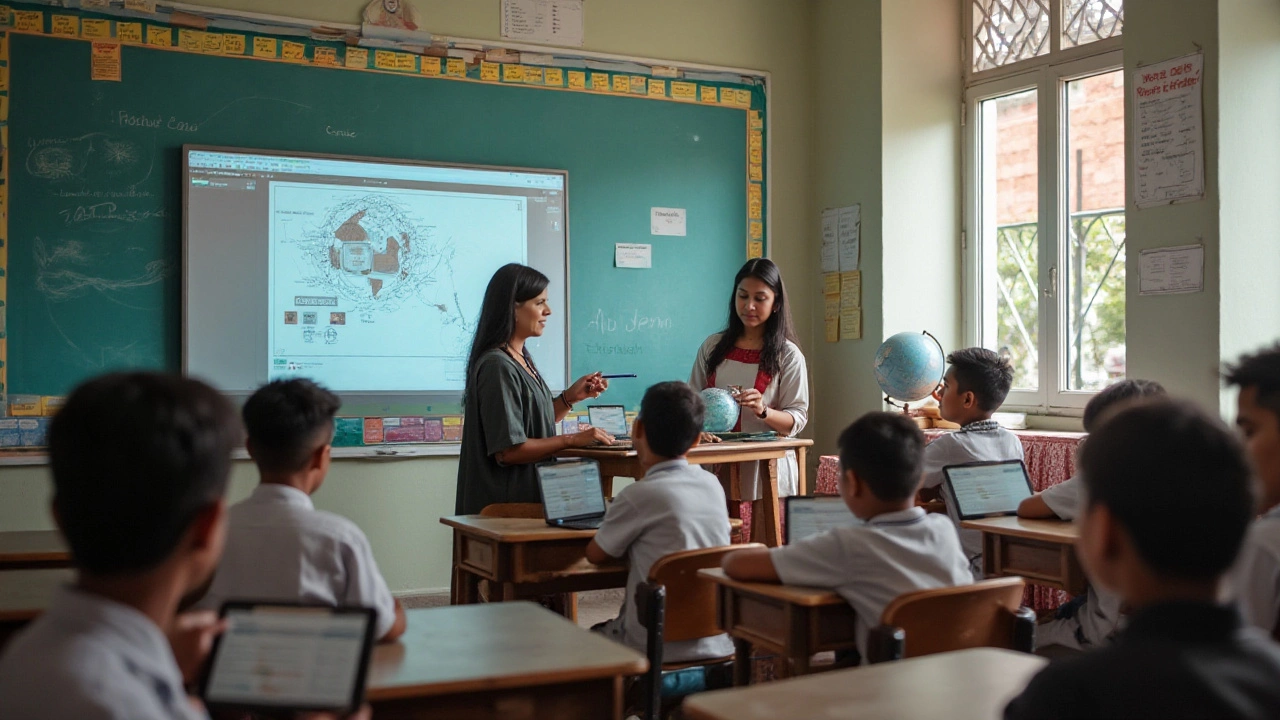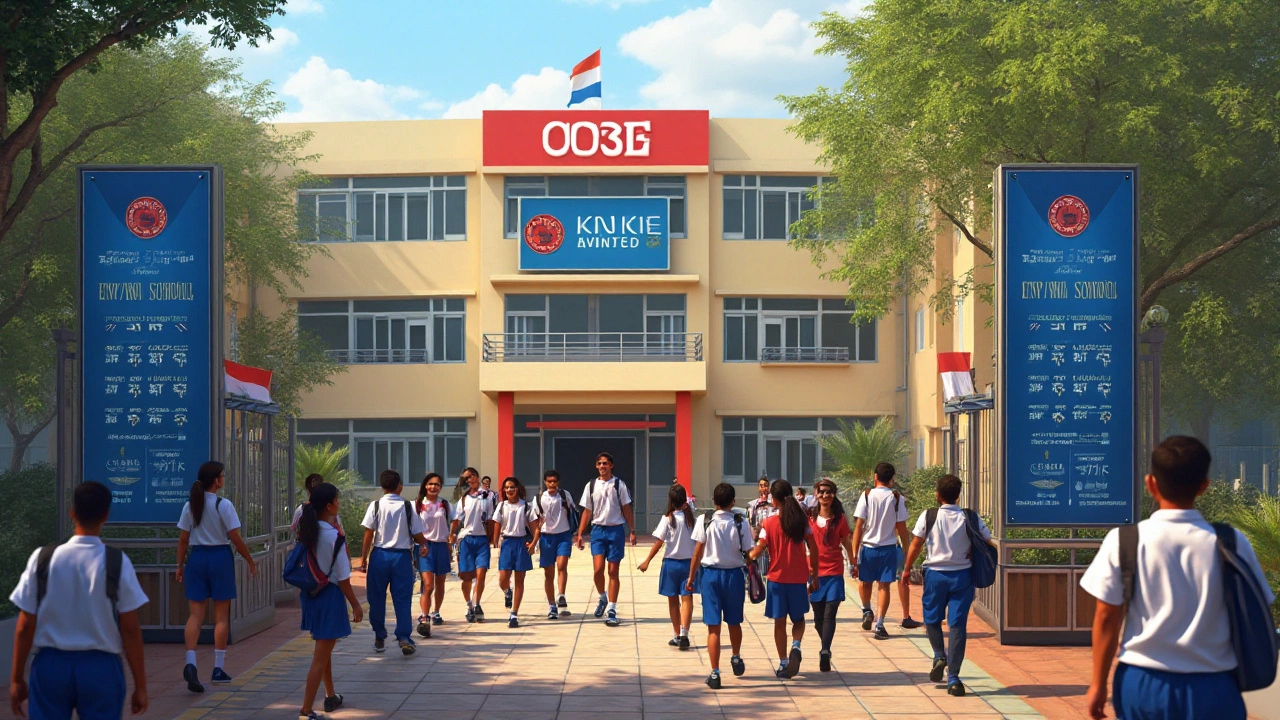In the quest to understand India's educational landscape, one question might stand out: which state boasts the highest number of CBSE schools? This isn't just about numbers; it's a story of educational trends, preferences, and the unique factors shaping these choices.
The Central Board of Secondary Education, or CBSE, is known for its comprehensive curriculum and standardized exams, making it a top choice across the nation. But one state surpasses the others in embracing this particular board of education.
Diving into this topic reveals intriguing insights not only about regional preferences but also the evolving educational desires of students and parents alike. We'll explore the factors that contribute to the dominance of CBSE schools in certain areas and offer tips for selecting the right school in this vast network. Let's embark on a journey to understand the dynamics of CBSE schools across India.
- The Popularity of CBSE Schools in India
- Which State Leads the Way
- Reasons Behind the Popularity
- Comparing CBSE to Other Educational Boards
- Interesting Facts about CBSE
- Choosing the Right CBSE School for Your Child
The Popularity of CBSE Schools in India
The Central Board of Secondary Education, widely known as CBSE, has established a formidable presence across India's educational landscape. With its schools scattered throughout the nation, the board is a preferred choice for many due to its structured curriculum and the way it prepares students for competitive exams. But what exactly makes CBSE so popular? The answer lies in its comprehensive syllabus, which follows a gradual progression designed to align with modern educational needs. This method ensures that students not only acquire knowledge but develop critical analytical skills as well.
One of the reasons parents and students gravitate towards CBSE is the strong emphasis on core subjects such as Mathematics and Science, balanced with other subjects that promote holistic development. The board's exam pattern is known for its relevancy and fairness, providing a level playing field for all. In addition, CBSE holds a recognition status not just nationally, but internationally as well. As stated by a renowned educational commentator, "The appeal of CBSE is indisputable, given its ability to equip students with skills needed in a global environment."
Moreover, an overwhelming number of competitive exams in India, including medical and engineering entrance tests, are based on the CBSE syllabus. States with a high number of aspiring professionals naturally favor this board as it aligns with their ambitions. Take into consideration that states like New Delhi, Uttar Pradesh, and Maharashtra host numerous CBSE-affiliated schools. The adoption of technology in schools, including smart classrooms and online assessments, further boosts the appeal of CBSE as a forward-thinking educational board.
"CBSE's curriculum has transcended traditional boundaries, offering a learning experience that caters to global benchmarks," says Prof. Ankit Sharma, an education strategist.
Despite the many positives, the true popularity of CBSE can be gauged through the statistics. As of recent years, there are over 21,000 CBSE schools across India, with numbers steadily increasing. A significant percentage of these institutions are located in urban centers, but there is a proactive movement towards expanding into rural areas, thus making quality education more inclusive. It’s an exciting time, as the board continues to adapt to changes and challenges presented in education.
Table of Recognized CBSE Schools by State
| State | Number of Schools |
|---|---|
| Uttar Pradesh | 4546 |
| Maharashtra | 2260 |
| Kerala | 1348 |
Which State Leads the Way
India is a diverse nation, with its cultural and educational landscapes reflecting a multitude of influences. Among many educational boards, the CBSE stands out due to its popularity and national reach. But when it comes to density, one state stands head and shoulders above the rest. Uttar Pradesh consistently ranks as the state with the highest number of CBSE-affiliated schools. With its vast population and rich educational infrastructure, Uttar Pradesh embraces the CBSE curriculum with open arms.
This is not merely a statistical anomaly. Instead, it highlights an enduring preference within the community for the structured and coherent educational path CBSE provides. The state, being one of the most populous in India, inevitably has a high demand for schools that promise a standard and recognized education system, which CBSE ensures. From major cities like Lucknow and Kanpur to smaller towns, the reach of CBSE schools extends throughout the entire state, making quality education more accessible to a large number of students.
Uttar Pradesh's position as the leader in CBSE schools is supported by various factors. Primarily, there's the high literacy rates and a strong belief in educational attainment. Families here often prioritize a structured and recognized educational curriculum, which has led to a vast network of such schools.
"Education is the cornerstone of a bright future. The popularity of CBSE schools in Uttar Pradesh speaks volumes about the aspirations of our state's youth," notes a state education official.Additionally, the state's emphasis on cultivating academic excellence through competitive exams has nudged students and parents alike towards the reliable framework that CBSE offers. This trend is one reason why Uttar Pradesh sees continued growth and development in the educational sector.
Moreover, there's also an ample investment from both private and governmental bodies in enhancing educational infrastructure. Such support has paved the way for more schools to affiliate with CBSE. This strategic alliance benefits students by providing them with modern facilities, experienced teachers, and a curriculum aimed at holistic development. Consequently, the residents of Uttar Pradesh enjoy a remarkable educational ecosystem, creating a promising future for students in the state.
With a significant number of schools associating with the CBSE board, students in Uttar Pradesh get distinct advantages. For one, they have a shorter distance to access reputed educational institutions, reducing the urban-rural gap in learning opportunities. The proliferation of CBSE schools also exemplifies the increasing competitiveness among educational institutions to cater to the evolving aspirations of students, ensuring the best possible learning experiences. In a state where educational inequality could have been rampant, the dominance of CBSE schools goes a long way in leveling the playing field.

Reasons Behind the Popularity
When exploring why the Central Board of Secondary Education, or CBSE, holds a significant foothold in India's educational system, especially in certain states, several factors come to the forefront. A key reason is the standardized nature of the CBSE syllabus, which is crafted to maintain consistency in education across the country. This uniformity provides a sense of stability and predictability for families that frequently relocate, such as those in the armed forces or corporate sectors, ensuring their children’s education is uninterrupted.
Beyond the uniformity, the CBSE curriculum is revered for its focus on analytical skills and conceptual learning, which gives students an edge in national competitive exams like the IIT-JEE and NEET. This examination-center approach garners trust from parents who aspire for their children to enter prestigious technical institutes, prompting them to choose CBSE schools in large numbers.
The editability of CBSE textbooks is another contributor to its popularity. Edited and updated centrally, the content mirrors advancements in educational methodologies and global trends, making it adaptable and relevant. Coupled with language preference, particularly for Hindi-speaking regions where CBSE integrates Hindi as a medium of instruction, it becomes the preferred board over others like ICSE or state boards which might not offer the same linguistic flexibility.
The vast network of CBSE schools is also stimulated by government initiatives promoting CBSE affiliation due to its comprehensive structuring. Large-scale public awareness campaigns have shown that more than 70% of parents admire the curriculum's breadth and adaptability. As noted by education analyst Priya Mehta, "The seamless integration of theoretical knowledge with practical application in CBSE has undeniably made it the prime choice for future-conscious education." This statement highlights the immense pressure on other boards to match the prowess displayed by CBSE.
"CBSE’s approach to holistic development is something other educational boards strive to achieve," says Dr. Sunita Sharma, a respected educational policy advisor.
Moreover, the expansive reach of CBSE ensures that teaching methodologies are modern, teachers are well-trained, and students have access to quality education resources. The CBSE Board’s emphasis on extracurricular activities, skills education, and vocational training further enhances its appeal among progressive parents who value all-rounded development.
An intriguing statistic lays bare the effectiveness of this popularity: A survey conducted by the National Council of Educational Research and Training revealed that nearly 85% of students pursuing science in their senior secondary levels are part of the CBSE framework. This number stands as a testament to the board's adherence to academic excellence and its reputation for quality education delivery, which continue to drive its widespread popularity.
Comparing CBSE to Other Educational Boards
In India, the educational backdrop is diverse, offering various boards catering to different curriculums and learning styles. Among them, the Central Board of Secondary Education (CBSE) stands out for its structured approach and national presence. But how does it stack up against the other regional and international boards? Let's delve into this comparison to offer a better understanding for students and parents deciding on an educational path.
The CBSE board is well-regarded for its consistency in education across India. With its schools administered uniformly nationwide, students relocating can seamlessly continue their education. On the contrary, the Council for the Indian School Certificate Examinations (CISCE) offers the ICSE and ISC exams, known for a detailed syllabus that emphasizes comprehensive understanding and analytical skills. ICSE schools, though fewer in number compared to CBSE, are often considered to provide a more balanced focus between science, arts, and language. But parents often find themselves wondering whether a structured approach or a balanced one will benefit their child in the long run.
State Boards, offering curricula tailored to local languages and culture, aim to align closely with state-specific educational requirements. This can be advantageous for students aiming to pursue higher studies within the state, as entrance exams may be based on the state board curriculum. However, students who frequently move or aspire for national-level competitions often lean towards CBSE, given its wider recognition. According to education expert Dr. Anil Kumar, "CBSE's curriculum equips students better for national entrance exams such as IIT-JEE and NEET, as these tests are based on the NCERT content." This gives CBSE an edge when it comes to preparing students for competitive exams and university admission tests.
There's also a comparison to be drawn with international boards. The International Baccalaureate (IB) and Cambridge International Examinations (CIE) provide global perspectives with a more flexible curriculum. These are typically chosen by parents focusing on holistic education for their children, preparing them for international universities. IB and Cambridge schools are scarce compared to CBSE, but they attract students aiming for study abroad opportunities due to their recognition worldwide.
CBSE's focus on rote learning has been a topic of debate, with critics arguing it needs to involve more critical thinking and application-based learning. However, recent reforms have introduced more practical assessments to address this. In comparison, IB's emphasis on student-driven projects and assessments like the Extended Essay and Theory of Knowledge projects allow for a deeper exploration. This is beneficial for fostering independent thought and research skills, which some might find lacking in CBSE's traditional exam-oriented approach.
The choice between these educational boards depends heavily on personal circumstances and priorities. Whether it's the standardized and competitive edge of CBSE, the comprehensive and practical learning in ICSE, state board specificity, or a global approach with IB and Cambridge, each has its merits. Parents and students need to evaluate their educational goals, career aspirations, and personal circumstances to decide which board aligns best with their vision for the future.

Interesting Facts about CBSE
The Central Board of Secondary Education, widely recognized as CBSE, stands as one of India's most prestigious educational boards. Its roots trace back to 1962, aimed at serving the emerging educational needs of the time. Today's CBSE is a vast umbrella under which numerous schools operate, adhering to high standards and offering robust curricular guidelines. What makes CBSE particularly compelling are the unique features and achievements it boasts over the years.
In terms of student enrollment, CBSE caters to millions of learners across the globe, with affiliated schools even in foreign countries. The syllabi are designed to be in sync with international educational trends, focusing equally on mathematics, science, and languages. Students often find the CBSE system beneficial for preparing for national-level competitive exams like the IIT-JEE and NEET due to its comprehensive approach.
One striking feature of CBSE is its continual evolution with time. The board frequently revises textbooks and syllabi to mirror the latest educational practices and scientific discoveries. Powered by a team of expert educators, it emphasizes conceptual understanding over rote learning. This educational philosophy has seen many of its alumni emerge as leaders in various fields.
A testament to its prestige comes from a report by the Ministry of Education, "CBSE's focus on analytical skills and modern teaching methods makes it a preferred choice for countless parents."
The board's presence isn't limited to India. With schools spread in numerous countries including the Middle East, Africa, and East Asia, CBSE serves as a bridge for families who travel and work globally. The consistency in its curriculum offers stability in educational transitions, making it an appealing choice for expatriates.
Furthermore, CBSE has embraced technology with open arms. In recent years, it has introduced digital learning resources, remote oversight of exams, and online teacher training programs. This shift not only helps in making the education accessible to more students but also keeps the system up-to-date in the digital age.
The board pioneers examinations with rigor and transparency. It's one of the first boards to implement coded answer sheets to avoid malpractices during evaluations. Such innovations uphold the integrity and trust associated with the educational board, making it a benchmark for others to mirror.
Apart from academics, CBSE places significant emphasis on extracurriculars. It encourages schools to host co-curricular activities and sports, believing in a holistic development model. It's interesting to know that many accomplished athletes in India have been CBSE students, a testimonial to its support for sports and other activities.
These facts not only underline why a state might have the highest number of CBSE schools but also cast light on why the board enjoys widespread acclaim and loyalty among parents and educators. It continues to adapt to the ever-changing educational landscape without losing its core essence of providing quality and balanced education.
Choosing the Right CBSE School for Your Child
Selecting the right CBSE school for your child can feel like navigating a sea of choices, each with its own promises and potential pitfalls. You've probably heard from friends, family, and even social media about which schools are the 'best'. However, the 'best' school isn't just about reputation; it boils down to the perfect fit for your child’s unique needs and interests. Every child is different, with distinct learning styles, extracurricular interests, and academic goals. Therefore, when considering a CBSE school, start by understanding your child's strengths and areas of improvement. Consider whether the school boasts a supportive environment that nurtures creativity and critical thinking, elements essential in the CBSE framework.
Not all schools follow the same teaching methods, even within the CBSE affiliation. Some might focus heavily on academics, while others might offer a more balanced approach with equal emphasis on arts, sports, and other co-curricular activities. It's crucial to visit the schools, interact with the faculty, and observe the dynamism of classroom learning. Checking the infrastructure is also vital. A school with good facilities, safe surroundings, and modern amenities such as science labs, libraries, and sports grounds can make a significant difference in your child's educational experience. Remember, a well-rounded environment can foster not just academic excellence but also crucial life skills.
Mahatma Gandhi once said, "By education, I mean an all-round drawing out of the best in child and man—body, mind, and spirit." This philosophy underscores the importance of viewing education as more than just textbooks and exams.
Parental involvement is another aspect that shouldn't be overlooked. The best schools appreciate the role of parents in their child’s educational journey. Look for schools that have an open-door policy for communication with teachers, regular parent-teacher meetings, and programs that encourage parental participation in school events. This will not only keep you involved in your child's progress but also strengthen the home-school connection that significantly contributes to your child’s success. Accreditation and board results are crucial, but don't let them be the sole factor in your decision. A school might boast top results, but does it cater to your child’s holistic needs? Align the school's culture, mission, and philosophy with your understanding of your child’s needs and aspirations.
Before finalizing, let's talk numbers. A wise parent understands the importance of setting a budget, and it's crucial to assess whether the fees align with your financial expectations. But remember, the quality of education and available resources should justify the costs. Sometimes, a more affordable school might offer a child-centered approach that better meets your requirements. It’s often said that you should not judge a book by its cover; likewise, don't judge a school solely by fee structure. Finally, ask about additional fees, such as transport, meals, and special programs. These can significantly add to the cost of education. In summary, take the time to diligently research and visit schools, engage with their communities, and seek feedback from current parents. The decision lies in finding the school that not only fulfills academic excellence but also aligns with your child’s personal growth and happiness.
